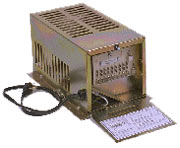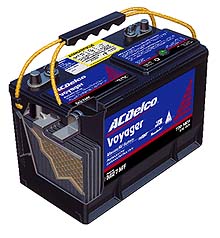
ELECTRICITY AND YOUR RV
As RVís become more complicated and have more electrical dependence it becomes apparent that an elementary knowledge of electricity can help an RVer enjoy the rig to the utmost.
In this short article I am going to:
- try to address some of the most common electrical problems I currently see in my shop.
- give you some idea of how to prevent and /or detect these problems
D.C. Electricity: The heart of the DC electrical system is the battery. Battery care is very important.
Some ideas to protect and maintain your battery
properly are:
1.
Check the water level regularly and use only distilled water to fill it
up. Many RVs will overcharge the battery and boil
it dry when left plugged into 120V AC. If you need to leave your unit plugged in, be aware you should keep an
even closer eye on your battery water.
2. While some converters will work fine when the battery is unhooked, for most it can cause problems. The factors involved in correct battery charging are too numerous to detail in this short article. I might also mention that maintenance free batteries are not recommended due to the inability to put distilled water in.

3. Keep the battery posts and top of the batteries clean. A battery can discharge itself across the top of dirty batteries. Dirty battery ports and connections can also cause a less than good connection which can cause inefficient charging and low 12V DC. A clean new fully charged battery sitting on the shelf can discharge internally in as little as 30 days. Periodic charging is necessary for batteries.

Purchase and use a 12V DC voltmeter in your rig. Many of the control systems run off 12V DC. 12V DC can control your refrigerator, air-conditioner, and water heater to name a few. When the 12V DC gets low it cannot properly control other systems. You might think an appliance has failed while the real problem is low 12V. A voltmeter will help you detect this. 14.2V DC is generally about the maximum voltage while 11V DC is the minimum for RV systems to operate correctly. Be certain your DC voltmeter is accurate.

If you have gel cell batteries or AGM you should be aware they charge at a different rate than regular wet cell batteries. Make certain your charger/converter has a gel cell setting and use it. I wonít go into great detail here but I would recommend gel cell users or AGM to do a little research for these type batteries. Also, be aware the alternator of your engine can over charge these type of batteries.

If you are ever in a shop and they are going to weld on your rig, be certain
they unhook all the batteries if it is electric or arc welding. This can be a
major safety concern.
Remember: While battery gases can be explosive this is not the only reason to unhook the batteries before welding. Damage to electric components can be very expensive.
120VAC: The major problem encountered with the 120VAC circuit in a rig is low
voltage supply. Often when you pull into a park in mid-afternoon the
voltage is okay. As the park fills up and more people start running their
air-conditioners, etc. the voltage can drop. Most manufacturers of RV
components say 105VAC is the minimum voltage recommended. Be certain you
have a volt meter and it's calibrated properly.
Another 120VAC problem I often see is extension cords. Your extension cord should be 10 gauge and not in excess of 25 feet plus your shore line cord (wire size runs opposite the number, 10 gauge is larger than 12 gauge, etc. ). Here again use an accurate meter if in doubt.


DC Amp Meter AC Voltage
Meter
Make certain your shore line cord has the proper end as supplied by the manufacturer. Those 15/30 adapters are handy sometimes but remember most air-conditioners use almost 15 amps by themselves. Do not run an air conditioner while using a 15/30 adapter. Be sure to keep your prongs on your shore cord end clean and bright. I have often seen the positive side of these be so discolored and pitted that up to 20 volts was lost at the connection. You can tell which one it is if there is a problem. It will be orange in color and ugly, not bright and shiny. In a 50A connection you have two of these and they are parallel to each other and across.

30/15 Adapter
Thank you for reading this. I have not even attempted to go into depth but
just a brief overview. I do believe if you will pay attention to these items I
have mentioned you will do away with many of the most common electrical problems
in an RV
Happy Rving!
Back to Motley RV Repair Home Page Back to Motley RV Repair RV Care/ Use Articles